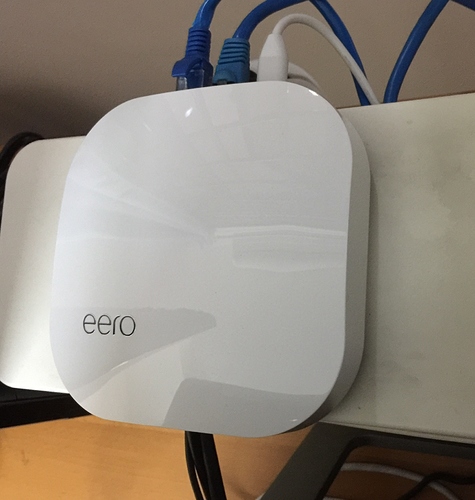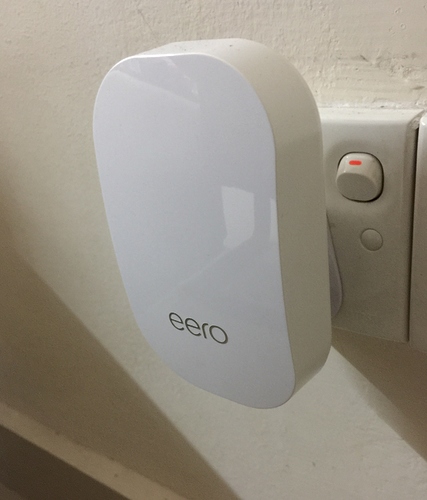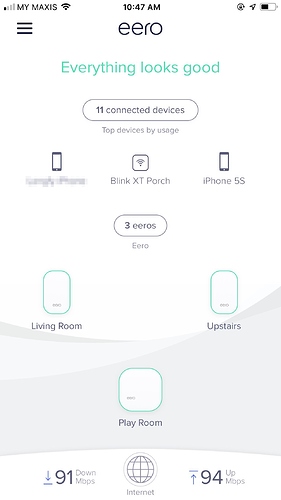How much difference does meeting a literal definition of ‘mesh’ make? I suspect that 99.9% of people will never need more than a 3-Orbi setup.
Probably true, but it depends how your house is arranged. I’ve barely managed to get pretty much full coverage in my parents’ (very old, stone/brick internal walled, house) by running powerline from the ISP router/modem to the Orbi hub in a central location. If that’s not an option, or if your router/modem doesn’t play nice with the Orbi, you could be in trouble if your internet comes in at one end of a long house.
Anyway, I only mentioned it because I didn’t want anyone to get blindsided by it not actually being a mesh. I didn’t realise that until after I’d bought the second satellite.
Does not being a true mesh mean it doesn’t handle hand-offs properly, suffers in terms of speed, or (worse) needs to have different wireless networks? I take it that you still use your router wi-fi network, so maybe I only need one for the back of the house, as the router should work for the front?
I had skimmed the wirecutter article, maybe I’ll have a closer read.
The main downside is simply that you’re restricted to a (rough) sphere of range from the hub, rather than being able to extend from unit to unit. It’s (probably, theoretically) quicker than a true mesh as the signal only has to do one extra hop.
Like I say, my parents have pretty much the worst case scenario for wifi, short of a lead bunker, and it still just about works, so I wouldn’t worry too much. Just be aware that you can’t extend it arbitrarily by adding more satellites.
Anecdotal, to be sure, but I’m very happy with the Linksys Velop.
I was tired of the constant complaints from my wife and kids about wifi dropping in the bedroom, even after installing a new AC2300 router. I gave the router to my son for his dorm room, and I got the three-node Velop.
Now, wireless is available anywhere in the house, even out in the back patio. It dynamically changes channels, and will pick 2.4/5Ghz networks seamlessly. Netflix and Plex stream beautifully now to any device.
There are limitations to Mesh. I added a Mesh extender to my traditional router. It’s been working pretty well so far. I am not always sure which one I am on though, but my gaming stuff is a lot closer to the router.
No to all of those potential issues. The Orbi handles them fine. No separate network. Speed great. Handoffs automatic.
But the overall point is valid in that Orbi isn’t a full mesh like some of the others.
Diego
I’m using Eero. I think they claimed they are a mesh network. You can buy the Eero Base (which is really small, Apple TV size) and then extend it via Eero Beacon. The Beacon are half the size and goes straight to the wall plug and can act as a night light, so that’s pretty useful and unobstructive. Eero gives you a 2.4ghz and 5ghz band and just one SSID and therefore have very reliable hands off. No problem in my double storey house.
It allows you to create Guest network so you can have guests connect to a “separate” SSID. You can create profiles and set schedule for switching it off so the kids can’t connect after bedtime.
The other thing is that the setup is super easy and all admin stuff done via a beautifully designed iPhone app. No way I’m going back to klunky and ugly web browser admin console.
I can also get another Base for upstairs and then connect the PC or XBox into the Base via Ethernet so I still get internet connectivity for the PC which does not have WiFi. The Beacon does not have Eth port, only the Base. In this case, Eero form a wireless backbone between downstairs and upstairs. Super easy.
Base and Beacon pictured above.
Edit to add this screenshot of the app.
I’m still using a b/g router. What are the advantages of a/c? I have about half a dozen devices that use wifi, but they are not all being used at the same time. Also, my last InternetSpeedTest indicated that I get 16.19 mbits down and 11.52 mbits up (over b/g wifi).
AC is much faster and uses the 5Ghz band which has less interference in urban areas. I get around 600Mbps speedtests on my 3x3 MIMO laptop, and 400Mbps on my phone.
Yeah, it’s way faster, especially if you don’t even have N on your current router. If you have anything over a 25Mbps internet connection it’s probably limiting your speed. And if you want to transfer files over WiFi between devices you would see an enormous upgrade.
Yeah, I mean, a B/G router with no N has got to be a good 10 years old.
There’s a promotion at Eero now $100 off if you buy a Eero base station and two beacons and one year subscription of Eero Plus ( which gives you Malwarebytes and 1Password). Essentially they are letting you try Eero Plus for one year free with that $100 off. Use code ATP at checkout… or if this links work:
I don’t like it… doesn’t look like a space ship
he he, you might like Asus’s Diablo gateway to hell then …
When it comes to looking like a spaceship, I really think my AP has y’all beat.
I use Eero pro and I’m currently seeing about 800 Mb/sec around the house. Now I need to invest in faster wireless adapters. Expensive system, but worth it.
Any tips on what could be limiting my wi-fi bandwidth? I’m currently using the ISP supplied modem-router, which is advertised as tri-band, ac, MUMIMO, etc., called the Bell Home Hub 3000. On the gigabit port I get 700-800Mbps down and up. On wi-fi across a range of devices including a laptop I seem limited to 80-90mbps, even line-of-sight. I have a common SSID between 2.4 and 5 Ghz and it seems to be enabled to b/g/n. I tried playing with 5ghz only and it didn’t seem to improve. Maybe I should just buy the spaceship shown above?
Your adapter being configed to only b/g/n seems strange. It should be set to 802.11ac. Otherwise 80-90mbps is about right for 802.11n I think.



